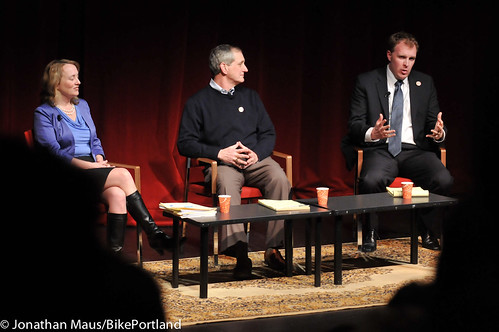
The three leading candidates for Portland mayor took to the stage at Lincoln Hall on the campus of Portland State University last night. Organized by the PSU Planning Club and sponsored by a host of local transportation, land-use, and environmental advocacy groups, well over 400 people attended the event and organizers say they had to turn people away as the auditorium hit capacity.

The candidates — Eileen Brady, Jefferson Smith, and Charlie Hales — all represented themselves well and it’s clear that no matter who Portland picks as it’s next mayor, active transportation will not be ignored. All of the candidates spoke highly of maintaining and increasing our investments in transit service and making streets safer for walking and biking. That being said, key themes and differences emerged among them.
And, while one of the moderators reminded everyone that, since this is Portland, everyone needs to be “Really, really polite,” there was a minor sparring match between Brady and Smith.
The questions ran the gamut of transportation issues; from how to engage under-represented communities, to the 2030 Bike Plan, to the Columbia River Crossing project.
The night’s first question asked how the City should engage with low-income communities, people of color, and disabilities to make sure their transportation needs are prioritized. The answers each candidate gave reinforced their profile and set the tone for the rest of the evening.
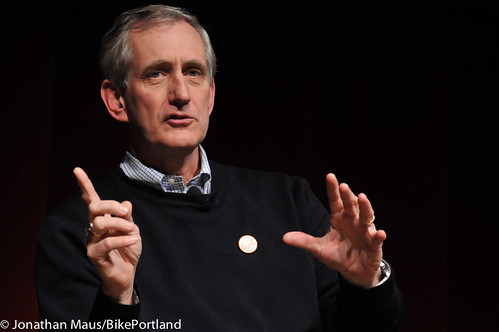
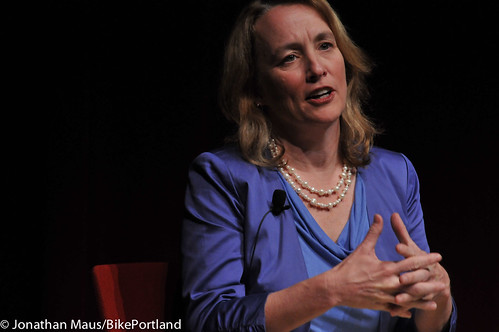
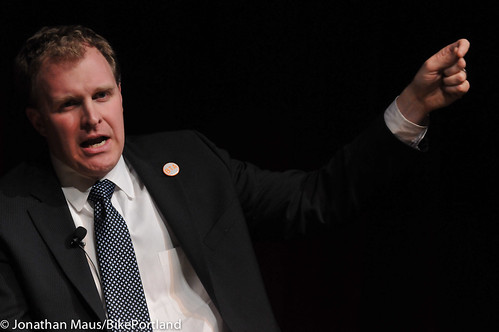
Hales’ answer drew on his experience as a former Portland City Commissioner in charge of the transportation bureau. He advocated a “sensitive” (modeled after the N. Williams Ave project) and “straightforward” approach that takes citizen input seriously, but that isn’t afraid to make a decision. Speaking of his experience taking MAX light rail to the airport, he said they held two meetings and then, “We closed the books and built the thing.”
As an east Portland resident, Smith seized the opportunity to address this question and spoke energetically and passionately about the need for “our budgets to be linked to our hearts and values.” Smith spoke about building a “broad-based coalition” and he repeated a common mantra in his campaign: “We’re all in this together.” His answer got a rousing applause from the crowd. Below is a recording of it so you can hear the spirit in his delivery…
[audio:jeff_equity.mp3|titles=Jefferson Smith on engaging communities]Brady’s answer to the first question also played to her strengths. The candidate who has been endorsed by the Portland Business Alliance took a question about how to engage under-represented communities and turned it into an opportunity to talk about creating jobs.
“East of 82nd, they want bus service to be able to get to their jobs… We need to create a virtuous cycle of more jobs, which means more revenue for TriMet [because bus service is funded through a payroll tax].”
“My nightmare is that we’ll be left with green building with no one inside of them and streetcars without any passengers.”
— Eileen Brady
It’s clear that Brady wanted to make jobs and the economy her #1 theme — even at a debate about active transportation. She said she wants to “bust the myth” that, “you can’t have a progressive city and a vibrant city at the same time.” Her “nightmare,” she explained, is that without creating more jobs, “We’ll be left with green building with no one inside of them and streetcars without any passengers.”
When the debate shifted to new funding strategies to get PBOT out of their budget pinch, Smith and Brady had the most pointed exchange of the evening.
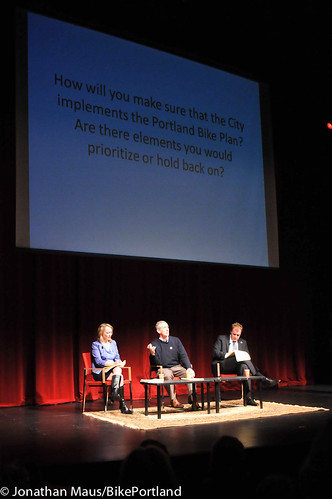
Saying “the gas tax is decreasing,” Smith proposed a slew of new revenue including a street maintenance fees (SMFs in wonk terms), a variable parking fee, and congestion pricing. He said the winning idea(s) should be based on our values and done in an equitable way.
Brady started off her answer by saying, “Jefferson, you have to do your homework.” Brady contested the assertion that the gas tax was decreasing. “Our gas tax revenues are up year over year,” she said. To Brady, the problem at PBOT isn’t a lack of revenue, it’s that the agency has “over committed to new projects.” She’d like to find money by squeezing more efficiencies out of PBOT and consolidating their various planning and policy groups “under single leadership.” Brady also advocated for further privatizing of PBOT’s Sunday Parkways event*.
(*NOTE: Sunday Parkways is currently 2/3 paid for by private funding. As for the gas tax question, the truth is that the amount of gas tax collected has bumped up because it was raised in 2009 (in HB 2001). However, as a source of funding overall, it is in steep decline and shows no sign of rebounding. Also, it was a drastically lower projection of gas tax revenue by the State of Oregon that put PBOT in a pinch. They had committed to projects based on rosy gas tax revenue projections that — because it is inadequate and not what it used to be — failed to materialize.)
“We can’t have ’20 minute neighborhoods’ if we have 50 minute bus service.”
— Charlie Hales
When pressed by a moderator for a specific revenue source, Brady said, “I think there’s more dollars there [at PBOT] than you know.”
Hales called the gas tax a “dinosaur” in the long run and advocated that we “move to some new system” and advocated a higher gas tax as a regional decision, not just in Portland.
Not surprisingly, all the candidates put a high priority on safety. When a question was asked about walking safety and sidewalk investments, I was surprised to hear both Brady and Smith mention that, due to funding realities, sidewalks won’t be built everywhere they’re needed. Instead, they both mentioned that in some cases, PBOT could just widen shoulders. Brady called that a “less expensive option,” and I heard jeers from several people sitting next to me (including a member of the City’s Pedestrian Advisory Committee.
Smith also used the walking safety question to address Brady’s “homework” barb. “I appreciate the admonition to do my homework,” he countered, and then pointed out that Brady is, “the one person to talk about no new revenue is the one doing the most drum-thumping for the CRC and PSU Sustainability Center projects.”
When it comes to how our transportation priorities support our Climate Action Plan, each candidate offered a different idea.
Brady said we should build up our electric vehicle infrastructure, saying, “It will be one of my top priorities.”
Hales said the key to stemming climate change is, “EBC,” or “Everything But Cars.” He spoke of building out our transit system and having frequent bus service “across the entire city.” Hales also got in one of his several memorable lines with, “We can’t have ’20 minute neighborhoods’ if we have 50 minute bus service.”
Smith used the question to focus on “pedestrians,” a voting block he said is “sometimes forgotten because most people don’t identify with it so it’s much harder to build political power.” A lack of good walking access, according to Smith, is “a common denominator in a lot of problems we face.” We need to build and plan our city so that, “An 8-year old can walk to school and an 80-year old can walk to the store,” he said.
When the controversial CRC freeway expansion project was brought up, each candidate stuck to their positions.
Hales said he senses a “convergence around common sense” taking place with the project, that it “has to be sized to the funds available,” and that it “must have light rail to Clark County and first-class bike and pedestrian facilities.”
Smith wanted to talk about options to the current design. “What does plan b look like?” he asked. (Smith’s answer echoed the thoughts he shared with me in our interview published yesterday.)
Brady said we’ve come too far in planning the project to give up on it now. She called the $140 million we’ve already spent an example of “government run amok,” and added that, while it’d be “really easy to say, ‘let’s start over,'” she warned, “It may take us another 10 years to get back to the point we’re at right now.” After that line, a man in the crowd yelled, “Good!” and several people clapped.
“We should move on this project,” said Brady, “I want to push this through and get it done… We have the opportunity. I say, grab it!”
After the main questions, a moderator posed a question from a 5th grader in the audience who wanted to know what the City’s role could be in making cycling safer for families and school-aged children. Hales spoke about stepping up enforcement against people riding without lights and helmets, Smith brought up the need to tackle traffic speeds, and Brady said we should have the Safe Routes to Schools program at every school.

After the debate, I asked a few people during the reception what they thought. The reviews of the candidates’ performances were mixed.

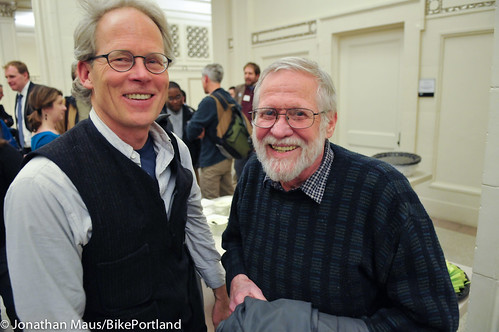

BTA Director Rob Sadowsky said, “We win with all of them,” but he noted a collective “gasp” from the many PBOT employees in the room when Brady brought up finding “efficiencies” in the agency. When I asked a friend who works at PBOT about Brady’s comments, he said, “That’s already on par with what we’re doing.” (As per a directive from Director Tom Miller, PBOT is consolidating some of its planning and safety groups.)
David Hampsten, a noted east Portland neighborhood activist said he felt all three candidates were “positive.” He really liked Hales’ points about increasing community policing (specifically, getting cops out of cars and onto their feet and on bikes), especially around transit stops.
Matt Picio, founder and president of the non-profit Cycle Wild, said the event made him realize he’s “absolutely not voting for Eileen Brady.” Picio cited her focus on jobs as a revenue generator and her pro-CRC stance.
Brady’s CRC stance also resonated with veteran transportation activist Jim Howell (he was around during defeat of the Mt. Hood Freeway). “I’m scared of her and her ‘get in and get that project built!’ comments.”
Overall, I think all three candidates should feel good about their performance.
Hales was clearly the most comfortable with these topics — which isn’t surprising given his experience as a streetcar consultant and former City Commissioner. He connected with the audience several times; around his ideas for bold projects like a bikeway to Astoria along the river and his memorable one-liners. While Brady was clearly the furthest from her comfort zone, she held her own and gave voters a lot to think about. Smith had more concrete ideas and passion around his principles than the others; but his delivery and his penchant for cracking jokes sometimes distracted from them.
What did you think? Did this even help you decide who will get your vote? In case you haven’t read them yet, don’t miss my interviews with Hales and Smith. I hope to sit down with Brady soon.

